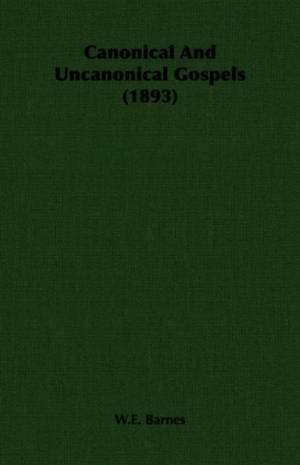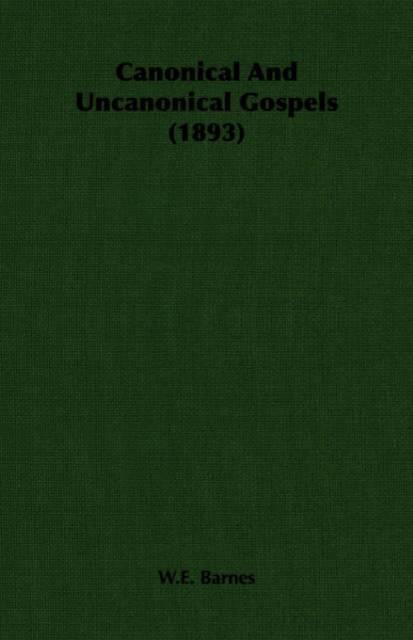
- Afhalen na 1 uur in een winkel met voorraad
- Gratis thuislevering in België vanaf € 30
- Ruim aanbod met 7 miljoen producten
- Afhalen na 1 uur in een winkel met voorraad
- Gratis thuislevering in België vanaf € 30
- Ruim aanbod met 7 miljoen producten
Zoeken
Omschrijving
CANONICAL AND UNCANONICAL GOSPELS (1893) By W. E. BARNES, B.D. PREFACE MY object in writing the following pages is to throw light on a subject on which many important misconceptions prevail. Even educated people are content to speak as if the Four Gospels had no history at all, or as if the}' first appeared in the fourth century A.C., coming from an unknown source. This treatise, therefore, will not be wholly useless if it makes it clear that the Canonical Gospels were beyond all doubt received as The Four Authoritative Gospels at least one hundred and twenty years before Constantino established Christianity as the State religion. Neither the first Christian emperor (311-337 A.D.), nor the great Council of Nicjoa (325 A.D.), had anything to do with "selecting," as some have supposed, our Four out of a large number of Gospels. If our Gospels were e\7er " selected " (and did not rather hold a position of authority from the first), the selection took place apart from the worldly influence of a half-pagan emperor, and certainly more than a century before his reign. In the time of (Amstantine, our Gospels had already a long and honourable history behind them. But I do not write these pages simply to disprove the notion that the Gospels first became authorities in the fourth century A.a Still more prevalent is the more plausible contention that the Four Gospels (with the exception of S. Luke) are not to be traced during the hundred and fifty years which immediately followed Our Lord's death. One object of this book is to show that this contention is false, and that even if it were true, it would be misleading. The main features of the Story of Christ's Life can be traced back continuously to within thirty years of His death. The narrative cannot be shaken, even if the usual authorities for it be proved to be more recent than we believe. The argument might have been much strengthened by a statement of the evidence to be derived from the use of one or all of our Four Gospels by the chief schools of heretics of the second century. Even the author of "Supernatural Religion" admits that the evidence to be derived from Marcion's Gospel proves the existence of our Gospel of S. Luke as early as 140 A.D. But this evidence, together with other evidence drawn from the practice of heretical schools, is not given here, because it consists chiefly of a mass of linguistic detail. It may, however, be mentioned that all schools of Christian Gnostics of the second century, the Ophites, the Basilideans and the Eastern and Western schools of the Valentinians all alike appealed to our Gospel of St. John. On the other hand. I have been careful to notice any evidence recently brought to light. Such evidence will be found chiefly under "Tatian" and "Hermas." I have also tried to impart some freshness to the treatment of the subject by drawing from the original authorities wherever it was possible. T his is especially the case with Eusebius, Justin, and Tatian.
Specificaties
Betrokkenen
- Auteur(s):
- Uitgeverij:
Inhoud
- Aantal bladzijden:
- 136
- Taal:
- Engels
Eigenschappen
- Productcode (EAN):
- 9781406712360
- Verschijningsdatum:
- 8/05/2006
- Uitvoering:
- Paperback
- Formaat:
- Trade paperback (VS)
- Afmetingen:
- 140 mm x 216 mm
- Gewicht:
- 181 g

Alleen bij Standaard Boekhandel
+ 48 punten op je klantenkaart van Standaard Boekhandel
Beoordelingen
We publiceren alleen reviews die voldoen aan de voorwaarden voor reviews. Bekijk onze voorwaarden voor reviews.











